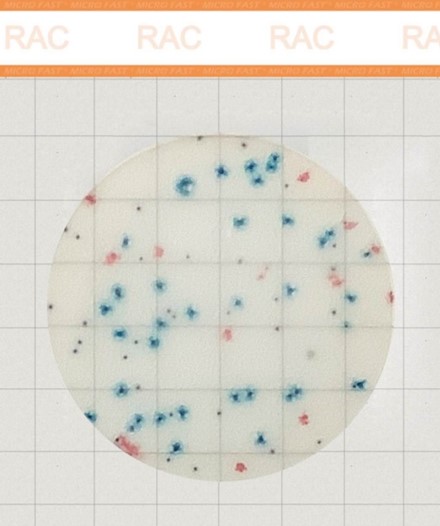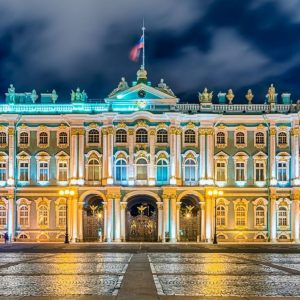- Antibiotics Tests in Milk
- Inhibitory detection test
- Laboratory equipment
- Centrifuges
- Indicator strips
- Autoclaves
- Scales
- Thermometers
- Packing
- PureTrust ATP monitoring
- ATP monitoring PIONEERPRODUKT CleanTrust
- MICROFAST® substrates
- Nutrient media
- Ice cream sticks
- Consumables
- Detergents and disinfectants
- Treatment agent
- Milk filters
- Wipes
- Gloves
- Sampling
The number of fake theater websites has skyrocketed in Russia
From June to August of this year, experts from BI.ZONE (a subsidiary of Sberbank) recorded a tenfold increase in the number of domains of fraudulent theaters: if at the beginning of summer they found 32 links to such resources, by the end of summer their number increased to 351, according to company research (available from RBC). Another 319 links to fraudulent sites were found in search engines.
Fake theater websites look almost the same as the real ones: they contain a description of the performances of the new season, a poster, as well as a notice about the possibility of buying tickets online in connection with the pandemic. But after payment, the victim, of course, does not receive any tickets.
Most often, the attackers forged the sites of the Theater of Satire, Lenkom, the Maly Theater, the Theater. Leningrad City Council, theaters. Stanislavsky, Vasiliev, Tovstonogov, children's theater "Aquarium". Moreover, for the majority of phishing domains, the scammers took the website of the State Academic Theater of St. Petersburg "Comedian's Shelter" as a basis. As the BI.ZONE expert explained, the interface of this particular site turned out to be easy to fake, but another RBC source in the cybersecurity market explained this by the absence of a special certificate on the specified site and its low level of cybersecurity.
Roskomnadzor blocked 1,000 sites with fake covid certificates Society
Among the productions cybercriminals most often offered were Three Comrades by Yuri Smekalov and Alexander Tsypkin, Faryatyev's Fantasies, Two on a Swing by William Gibson, Good. Very” by Vasily Shukshin, “Casanova”, as well as “Crime and Punishment” by Konstantin Bogomolov.
 Rapid tests for fluoroquinolone, erythromycin, lincomycin, tillosin and tilmycosin residues in milk, whey
Rapid tests for fluoroquinolone, erythromycin, lincomycin, tillosin and tilmycosin residues in milk, whey PIONEER MEIZHENG BIO-TECH (5 in1) JC0871/ Rapid tests for the determination of the residual amount of β-lactams, tetracyclines, chloramphenicol, streptomycins, ceftiofur in milk, whey.
PIONEER MEIZHENG BIO-TECH (5 in1) JC0871/ Rapid tests for the determination of the residual amount of β-lactams, tetracyclines, chloramphenicol, streptomycins, ceftiofur in milk, whey. Rapid 4 in 1 tests for determining the residual amount of neomycin, kanamycin, gentamicin, spectinomycin in milk, whey
Rapid 4 in 1 tests for determining the residual amount of neomycin, kanamycin, gentamicin, spectinomycin in milk, whey PIONEER MEIZHENG BIO-TECH (5 in1) JC0586 - Antibiotic tests 5 in 1 / Rapid tests for determining the residual amount of β-lactams, tetracyclines and cephalexin in milk, whey
PIONEER MEIZHENG BIO-TECH (5 in1) JC0586 - Antibiotic tests 5 in 1 / Rapid tests for determining the residual amount of β-lactams, tetracyclines and cephalexin in milk, whey Express-tests PIONER 5 in1 for the determination of thiamphenicol, meloxicam, colistine, trimethoprim, sulfonamides
Express-tests PIONER 5 in1 for the determination of thiamphenicol, meloxicam, colistine, trimethoprim, sulfonamides Rapid tests for determining the residual amount of tetracyclines in meat
Rapid tests for determining the residual amount of tetracyclines in meat- Express tests for determining the residual amount of β-lactams, tetracyclines, chloramphenicol, streptomycins in milk, whey
- ANTIBIOTICS / ELISA TESTS
- PIONEER MEIZHENG BIO-TECH (5 in1) JC1165 / Rapid tests for the determination of the residual amount of halofuginone, flavomycin, novobiocin, flunixin, dexamethasone / prednisolone in milk, whey
- Rapid tests for determining the residual amount of chloramphenicol in meat
 DV-E series viscometers
DV-E series viscometers Finger (pipettor) for pipettes
Finger (pipettor) for pipettes Piston oil sampler (d=20 mm, h cylinder=25 mm)
Piston oil sampler (d=20 mm, h cylinder=25 mm) Magnetic stirrer С-MAG HS7
Magnetic stirrer С-MAG HS7 HI 98509 Checktemp 1 Portable Electronic Thermometer with Remote Sensor
HI 98509 Checktemp 1 Portable Electronic Thermometer with Remote Sensor Infrared analyzer "SibSCAN" (dairy products)
Infrared analyzer "SibSCAN" (dairy products)- Indicator strips "CHAS-100 mg",100 pcs
- Indicator strips "Protein", 100 pcs.
- Automated measuring complex "Laktan 1-4M" isp. 700
- Areometer AON - 1 (set of 19)
- RT5 Multi-Magnetic Stirrer with Heating, IKA
- Indicator strips "Total water hardness", 25 pcs.
- Laboratory pH meter/ORP meter/thermometer HI 5221-01 (pH/ORP/T) (Hanna, Germany)
- Milk quality analyzer "Laktan 1-4M" isp. 220
- ROTILABO® timers with countdown / countdown, white
 Korreks for confectionery
Korreks for confectionery Carton
Carton Paper for micro-ribbed
Paper for micro-ribbed KH PACK® tartlet paper
KH PACK® tartlet paper Korreks for desserts
Korreks for desserts Grease and barrier paper KH PACK®
Grease and barrier paper KH PACK®- KH PACK® bag making paper
- GableTop aseptic packaging
- Backed Foil
- Plastic packaging for cakes and pastries
- The paper packing fastened anticorrosive UNIK 14-70 THAT 5453-003-05773103-2005
- Ice cream chopsticks
- Paper sacks
- Salad dressings
- Skiving and Hemming Technology
 Ice cream sticks Standard 93
Ice cream sticks Standard 93 J-Bottom technology
J-Bottom technology General purpose environment of SPC "Biocompass-S" (Uglich)
General purpose environment of SPC "Biocompass-S" (Uglich) Wafer cup and cone
Wafer cup and cone Petri dish 90 mm
Petri dish 90 mm Ice cream sticks Magnum (curly)
Ice cream sticks Magnum (curly)- Ice cream sticks (round)
- Ice cream sticks (with logo)
- Auxiliaries for sugar products
- Ice cream sticks Standard 114
- Pepsin whey pork
 Milk filter for fine purification of milk for 2, 5, 10 tons
Milk filter for fine purification of milk for 2, 5, 10 tons Foam cup for udder treatment
Foam cup for udder treatment Bag filter 32
Bag filter 32 Alkaline detergent (20l / 24kg)
Alkaline detergent (20l / 24kg) Plastic bracelet
Plastic bracelet Drencher for feeding calves with a rigid probe
Drencher for feeding calves with a rigid probe- Veterinary glove to the shoulder and through the neck
- Mug for milking the first streams of milk.
- Disposable nitrile gloves (packing 100 pieces)
- Apron and armlets
- Liquid soap "Prestige" (yellow, green, red) 5 l
- Rubber rings for castration
- Gas tailing cutter
- Dosing syringe, hose attachment
- Sticky fly trap, 25cm*10m
 Substrate for accelerated determination of QMAFAnM, (catalog number LR1321)
Substrate for accelerated determination of QMAFAnM, (catalog number LR1321) MicroFast® Microbiological Substrates
MicroFast® Microbiological Substrates MicroFast® Lactic Acid Bacteria Count Plate (Part Number LR1312)
MicroFast® Lactic Acid Bacteria Count Plate (Part Number LR1312) MicroFast® Enterobacteriaceae Count Plate (cat. no. LR1011)
MicroFast® Enterobacteriaceae Count Plate (cat. no. LR1011) Coliform Count Plate (catalog number LR1002) MicroFast® Coliform Count Plate
Coliform Count Plate (catalog number LR1002) MicroFast® Coliform Count Plate Substrate for determining the number of staphylococci (Catalog number LR1005) MicroFast® Staphyloccocus aureus Count Plate
Substrate for determining the number of staphylococci (Catalog number LR1005) MicroFast® Staphyloccocus aureus Count Plate- MicroFast® Coliform & E.coli Count Plate
- MicroFast® Salmonella Count Plate (SAL), for the determination of Salmonella in food and environmental samples (Catalog #LR1006)
- Yeast & Mold Count Plate (cat. no. LR1003) MicroFast® Yeast & Mold Count Plate
- MicroFast® Staphyloccocus aureus Confirmation Plate Staph.aureus Confirmation Plate (cat. no. LR1005Q)
- MicroFast® Environmental Listeria Count Plate
- Substrate for determining QMAFAnM (catalog number LR1001)
- MicroFast® Bacillus cereus Count Plate (catalog number LR1010)
 Как дегустаторы "разбирают" вкус сыра и какие этапы проходит каждый образец, рассказала эксперт31.10.2025
Как дегустаторы "разбирают" вкус сыра и какие этапы проходит каждый образец, рассказала эксперт31.10.2025 Лукашенко поручил по-хозяйски развивать территории заповедников и осмотрел "деревню будущего"31.10.2025
Лукашенко поручил по-хозяйски развивать территории заповедников и осмотрел "деревню будущего"31.10.2025 Порядок там, где постоянно работают в тонусе. Сергеенко посетил сельхозпредприятия Браславского района31.10.2025
Порядок там, где постоянно работают в тонусе. Сергеенко посетил сельхозпредприятия Браславского района31.10.2025- Строго придерживаться технологии и болеть за свое дело. Как исключить падеж скота, рассказал председатель СПК31.10.2025
- Как жили дети войны? // Про блюдце замороженного молока, школу, недетские пытки и подвиги30.10.2025
- Минсельхозпрод рассказал, какие белорусские продукты наиболее востребованы в Африке30.10.2025
- В Минской области намолочено 2,5 млн тонн зерна вместе с рапсом и кукурузой29.10.2025
- Personal responsibility, modernization. What measures is the Ministry of Agriculture and Food taking to reduce mortality?29.10.2025
- На БУТБ началась реализация желатина для фармацевтической промышленности29.10.2025
- Проверьте, знаете ли вы историю на уровне ЕГЭ26.10.2025
- Lukashenko spoke out against simple solutions for the Vitebsk region and actions along the path of least resistance. 25.10.2025
- Производство молока, инвестиции. Какие точки роста на пятилетку видит руководство Витебской области25.10.2025
- Первичная задача - дойти до каждого сельхозпредприятия. Депутат о развитии АПК Витебской области25.10.2025
- Совместные проекты и обмен опытом. В каких направлениях Беларусь и Казахстан готовы развивать сотрудничество в АПК 24.10.2025
- Беларусь и Алтайский край намерены увеличить биржевую торговлю сельхозпродукцией24.10.2025
- Минск и Алжир готовят переговоры на высшем уровне. Почему Беларусь нацелилась на Север Африки?24.10.2025
 ФГБУ «ВГНКИ» получил статус референс-центра ФАО по контролю качества ветеринарных препаратов31.10.2025
ФГБУ «ВГНКИ» получил статус референс-центра ФАО по контролю качества ветеринарных препаратов31.10.2025 Модернизация птицефабрики «Карантайская» в Дагестане: инвестиции составят 945 миллионов рублей31.10.2025
Модернизация птицефабрики «Карантайская» в Дагестане: инвестиции составят 945 миллионов рублей31.10.2025 Обновление ветеринарных правил по борьбе с РРСС свиней вступает в силу в России31.10.2025
Обновление ветеринарных правил по борьбе с РРСС свиней вступает в силу в России31.10.2025- Конфликт между «Автотехцентром» и «Токаревской птицефабрикой»: иск на 18,7 млн рублей31.10.2025
- Аномальная жара в Воронежской области привела к гибели более 90 тысяч птиц31.10.2025
- АГРОСИЛА инвестирует 1,15 млрд рублей в модернизацию Пермской птицефабрики до 2026 года31.10.2025
- Россельхознадзор провел надзорный контроль за 18 тысячами тонн животноводческой продукции в Кировской области31.10.2025
- В III квартале 2025 года возбуждено 32 уголовных дела за нарушения в сфере животноводческой продукции31.10.2025
- На миллион меньше: Аргентина завершит 2025 год с сокращением поголовья крупного рогатого скота третий год подряд31.10.2025
- Уругвай усиливает санитарный контроль, чтобы сохранить лидерство на мировом рынке мяса31.10.2025
- RaboResearch: Мировой рынок говядины будет расти даже в условиях неопределенности31.10.2025
- Дешёвая аргентинская говядина? Нет, лучше открыть границу для мексиканского скота31.10.2025
- Цены на борщевой набор снизились, яйца и мясо подорожали в Тульской области31.10.2025
- В Тюменских кафе выявили нарушения при использовании мяса без ветеринарных документов31.10.2025
- Цены на говядину в Братске возросли более чем на 25%31.10.2025
- Цены на курицу выросли на 30%: новая реальность для семейного бюджета31.10.2025
 10 reasons to take a deposit04.05.2025
10 reasons to take a deposit04.05.2025 Михельсон предупредил о росте цен на газ в ЕС при отказе от СПГ из России31.10.2025
Михельсон предупредил о росте цен на газ в ЕС при отказе от СПГ из России31.10.2025 Швейцария ввела дополнительные санкции против России и Белоруссии31.10.2025
Швейцария ввела дополнительные санкции против России и Белоруссии31.10.2025- Dmitriev warned the EU of losses following the ban on plumbing fixtures from Russia.31.10.2025
- A tanker carrying Russian oil bound for India has been turned back after US sanctions.30.10.2025
- Минфин США снял санкции с Милорада Додика и членов его семьи30.10.2025
- Уитакер заявил об альтернативных санкциям мерах давления США на Россию29.10.2025
- ЛУКОЙЛ решил продать зарубежные активы из-за санкций29.10.2025
- Орбан решил обсудить с Трампом санкции против России29.10.2025
- Стармер оценил эффект санкций против «Роснефти» и ЛУКОЙЛа для Украины29.10.2025
- Bloomberg рассказал о выжидании индийских НПЗ после санкций против России29.10.2025
- The US has exempted Rosneft's German business from sanctions.29.10.2025
- The NYT sees a new level of US economic warfare in Trump's sanctions.25.10.2025
- The Kremlin promised a response to sanctions in line with Russia's interests.25.10.2025
- Zakharova promised "tough steps" in response to the 19th EU sanctions package.25.10.2025
- США ввели санкции против президента Колумбии25.10.2025
 В Британии предупредили о риске для миллионов из-за супербактерий06.01.2025
В Британии предупредили о риске для миллионов из-за супербактерий06.01.2025 Moscow court sides with Indian company in dispute with Health Ministry26.11.2024
Moscow court sides with Indian company in dispute with Health Ministry26.11.2024 Scientists estimate increase in mortality due to drug-resistant bacteria29.10.2024
Scientists estimate increase in mortality due to drug-resistant bacteria29.10.2024- Antibiotics for livestock and pesticides found in poisoned family's home29.10.2024
- Izvestia reported on the shortage of widely used antibiotics in Russia29.10.2024
- The Ministry of Health called data on the shortage of antibiotics unreliable29.10.2024
- Scientists warn of threat of return to pre-penicillin times29.10.2024
- The Ministry of Health explained how attitudes towards antibiotics changed during the pandemic07.05.2024
- WHO explains the risks of taking antibiotics "just in case"06.05.2024
- Doctors warn of bad practices after government decision on antibiotics25.04.2024
- The Ministry of Health removed antibiotics and hormones from the standard treatment of ARVI25.04.2024
- Antibiotics in oil: myth or reality?06.03.2024
- Antibiotics in sour cream: myth or reality?05.03.2024
- Antibiotics in goat milk: effects, problems and control measures16.02.2024
- The Japanese will stop producing the popular antibiotic vilprafen in Russia23.12.2023
- Antibiotics in Milk21.12.2023
 Antibiotics in pollock25.02.2024
Antibiotics in pollock25.02.2024 Antibiotics in herring: myth or reality?12.02.2024
Antibiotics in herring: myth or reality?12.02.2024 Antibiotics in perch10.02.2024
Antibiotics in perch10.02.2024- Antibiotics in sprat: facts and myths10.02.2024
- Antibiotics in tuna: an important health and environmental issue09.02.2024
- Antibiotics in meat30.01.2024
- Antibiotics in chebureks: myth or reality?29.01.2024
- Antibiotics in cutlets: problem or myth?18.01.2024
- Antibiotics in Chicken: Where Are the Highest Concentrations?17.01.2024
- Antibiotics in carp17.01.2024
- Where Are More Antibiotics in Chicken: Reality and Cautions16.01.2024
- Antibiotics in Salmon: Safety and Product Quality16.01.2024
- Antibiotics in Turkey15.01.2024
- Antibiotics in Sal: Reality and Safety Issues15.01.2024
- Antibiotics in Fried Dumplings: Facts, Risks and How to Stay Safe15.01.2024
- Antibiotics in sausages14.01.2024
 Antibiotics in Coffee: Myths and Reality03.05.2025
Antibiotics in Coffee: Myths and Reality03.05.2025 Forged forks: 10 interesting facts16.05.2024
Forged forks: 10 interesting facts16.05.2024 Swimming pool and weight loss: 10 interesting facts10.03.2024
Swimming pool and weight loss: 10 interesting facts10.03.2024- Tests for antibiotics in milk - 10 interesting facts07.03.2024
- Cleaning the kettle from scale, 10 interesting facts...06.03.2024
- Antibiotics in beer: 10 interesting facts04.03.2024
- Wild boar, how to survive...01.03.2024
- Purulent mastitis, 10 interesting facts27.02.2024
- Lemon and alcohol: 10 interesting facts25.02.2024
- Mint - 10 interesting facts25.02.2024
- Wild boar, 10 interesting facts20.02.2024
- Wild boar and domestic pig: comparison and advantages20.02.2024
- Cottage cheese, 10 interesting facts20.02.2024
- 10 Interesting Facts About Milk19.02.2024
- How to Clean a Toilet - 10 Interesting Facts (Acid vs Alkaline)18.02.2024
- Goat's milk: 10 interesting facts16.02.2024
 Dicroceliosis in cattle09.03.2024
Dicroceliosis in cattle09.03.2024 Demodicosis in cattle01.03.2024
Demodicosis in cattle01.03.2024 Purulent mastitis of cattle27.02.2024
Purulent mastitis of cattle27.02.2024- Hypodermatosis in cattle20.02.2024
- Hemonchoz in cattle11.02.2024
- Bursitis in cattle30.01.2024
- Brucellosis in cattle29.01.2024
- Bronchopneumonia in calves27.01.2024
- Bronchitis in cattle26.01.2024
- Mortellaro disease in cattle24.01.2024
- White muscle disease in cattle23.01.2024
- Babesiosis in cattle22.01.2024
- Cattle acidosis20.01.2024
- Arthritis in cattle20.01.2024
- Anaplasmosis in cattle18.01.2024
 Antibiotics for coughs: when they are needed and when they are not11.02.2024
Antibiotics for coughs: when they are needed and when they are not11.02.2024 Подростки тратили стипендию на алкоголь и курение. Суд лишил их права распоряжаться доходами 31.10.2025
Подростки тратили стипендию на алкоголь и курение. Суд лишил их права распоряжаться доходами 31.10.2025 Как правильно трудоустроиться, чтобы не попасть в список не занятых в экономике, рассказали специалисты31.10.2025
Как правильно трудоустроиться, чтобы не попасть в список не занятых в экономике, рассказали специалисты31.10.2025- В Лепельском районе мать пяти несовершеннолетних детей лишена родительских прав31.10.2025
- Нетрезвого водителя с более 3 промилле помог задержать в Минске неравнодушный гражданин31.10.2025
- Входящий и промежуточный контроль. Как усилят мониторинг трудовой дисциплины в Витебской области 30.10.2025
- Повышенное внимание - безопасности пожилых. В Могилеве обсудили работу по Директиве №130.10.2025
- На трассе в Могилевской области задержали пьяного водителя грузовика30.10.2025
- В Дятловском районе мужчина угрожал брату ножом и поджогом, возбуждено уголовное дело30.10.2025
- Врач: в Беларуси доступны новые методы лечения псориаза29.10.2025
- Более 260 лихачей остановили в выходные на дорогах Гомельской области 29.10.2025
- Около 41 тыс. случаев инсульта ежегодно отмечается в Беларуси 29.10.2025
- Нетрезвый водитель на столичной МКАД выехал на встречку29.10.2025
- Отсутствие ремней безопасности, проезд не по своей полосе. На что обращает внимание ГАИ при проверке маршруток 26.10.2025
- В Минтруда напомнили об основных мерах безопасности во время проведения республиканского субботника 25.10.2025
- In Minsk, an unlicensed BMW driver lost control and crashed into a pole.25.10.2025
Persons
Our Partners
Top 10
Our Test - Pioneer Tests
- Express tests for determining the residual amount of β-lactams, tetracyclines, chloramphenicol, streptomycins in milk, whey
- TEST KIT for determination of inhibitory agents PIONEERPRODUKT® DASH-TEST, WC0040
- PIONEER MEIZHENG BIO-TECH (5 in1) JC0586 - Antibiotic tests 5 in 1 / Rapid tests for determining the residual amount of β-lactams, tetracyclines and cephalexin in milk, whey
- PIONEER MEIZHENG BIO-TECH (5 in1) JC0871/ Rapid tests for the determination of the residual amount of β-lactams, tetracyclines, chloramphenicol, streptomycins, ceftiofur in milk, whey.
- PIONEER MEIZHENG BIO-TECH (5 in1) JC1165 / Rapid tests for the determination of the residual amount of halofuginone, flavomycin, novobiocin, flunixin, dexamethasone / prednisolone in milk, whey

